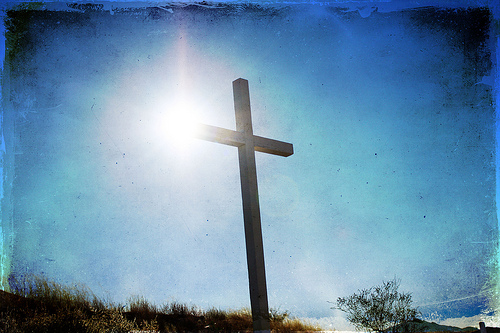September 14,2003
John 3:13-17
If you or I were starting our own religion, if we were outlining a new path to lead people to God, we would never choose the cross as our symbol. Because religion and spirituality are orientated towards eternal happiness, towards union with God, towards lasting joy, and the cross is a sign of suffering and death.
Historically the cross was invented by the Persians as in instrument for execution. It was then adopted by the Romans who inflicted it upon Jesus along with hundreds of thousands of other men and women who ran afoul of Roman power. Crucifixion was saved for the worst offenders because of its brutality and shamefulness. This made the cross a real stumbling block for the early church. As the early apostles went out to proclaim the good news, many drawn to Christianity were turned off when they heard that Jesus was crucified. Those early inquirers saw immediately what we often overlook: the cross is a form of capital punishment, a shameful method of execution. Before we domesticated the cross by including it into peaceful religious images and forming it into jewelry which we wear around our necks, the cross had the power to shock and offend. To catch some semblance of what this must have been like, imagine coming into a church and seeing in the sanctuary an image of Christ strapped into an electric chair or hanging from a noose. The cross was a sign of violence, brutality, and death.
So how is it that today we are gathered together to celebrate the feast of the Triumph of the Cross? How has this symbol of death become our symbol? How has it become for us a sign of life? It is not an easy question to answer. But let me point to two pieces of good news, two messages of life that come from our belief in the cross.
The first is this: The cross tells us that suffering is not punishment. When bad things happen to us, when we need to face sickness or loss, one of our most immediate reactions is, “Why is this happening to me? Why is God punishing me?” The cross, however, tells us is that Jesus, who was perfectly innocent and without guilt, was nevertheless crucified. Therefore, the easy equation between suffering and punishment, suffering and guilt is rendered invalid by the cross. We do not know why there is so much violence and evil in the world. We cannot explain why so many people have to suffer. But we do know that the simple assumption that pain is the result of my sin or punishment is a false conclusion in the light of the cross. The cross of Jesus tells us that suffering does not mean punishment.
The second piece of good news that comes from the cross is that suffering does not negate love. All through Jesus’ suffering, even as he died on the cross, God continued to love him. Indeed somehow the death of Jesus is completely circumscribed by love. Our gospel today says “God so loved the world that he sent his only son.” If God continued to love Jesus in the midst of suffering and death, then the cross of Christ tells us that when we suffer we can experience God’s love as well. The presence of the cross is not the absence of love.
Somehow God is present to us in our darkest hours. That makes the cross of Christ a sign of hope. Our heaviest burdens, our deepest pain, our most significant loss will not separate us from God’s love. Think of the heaviest burden you carry, the deepest evil you have to face, the hardest pain you need to bear. None of these indicate that God has stopped loving you. None of these evils separate you from God. If we can claim God’s love even in our deepest pain, then there is always reason for hope and always the possibility of life.
The cross which was a symbol of death has become for us a symbol of life. The cross which was an instrument of torture has become for us a proclamation of good news. The cross tells us that our suffering does not mean that we are punished, because one who was innocent, suffered as well. The cross tell us that our deepest pain cannot separate us from God’s love and promise of life. So let us today claim the cross for what it is: our sign of hope, our message of good news. No matter how deep our pain is, no matter how deep our loss is, the love of God is deeper still.

